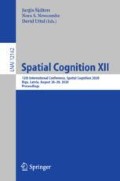Abstract
Applied spatial cognition research uses many different methods [1], but studies involving psychophysical methods remain quite rare. Here, we argue for the usefulness of psychophysical methods in spatial cognition and use them to address an applied research question. In the present study, we were interested in how sensitive humans are in detecting mismatches between map perspective and the first-person-view of an environment, and whether they exhibit biases in the perception of street angles. We demonstrate that Psychophysics is well-suited to approach these research questions, and provide the reader with a step-by-step description of how we developed our psychophysical study. In particular, we report which problems have to be solved when combining psychophysical methods with complex stimuli often encountered in spatial cognition, e.g. involving complex VR environments, and present our solutions for experimental design and data collection.
J. Frankenstein and F. Kessler—Contributed equally to this work.
Access this chapter
Tax calculation will be finalised at checkout
Purchases are for personal use only
References
Newcombe, N.: Methods for the study of spatial cognition. Dev. Spat. Cogn. 277, 303–326 (2013)
Huynh, N.T., Doherty, S.T.: Digital sketch-map drawing as an instrument to collect data about spatial cognition. Cartographica 42, 285–296 (2007)
Frankenstein, J., Mohler, B.J., Bülthoff, H.H., Meilinger, T.: Is the map in our head oriented north? Psychol. Sci. 23, 120–125 (2012)
Hölscher, C., Tenbrink, T., Wiener, J.M.: Would you follow your own route description? Cognitive strategies in urban route planning. Cognition 121, 228–247 (2011)
Richardson, A.E., Montello, D.R., Hegarty, M.: Spatial knowledge acquisition from maps and from navigation in real and virtual environments. Mem. Cogn. 27, 741–750 (1999)
Diersch, N., Wolbers, T.: The potential of virtual reality for spatial navigation research across the adult lifespan (2019)
Vandenberg, S.G., Kuse, A.R.: Mental rotations, a group test of three-dimensional spatial visualization. Percept. Mot. Skills 47, 599–604 (1978)
Kozhevnikov, M., Hegarty, M.: A dissociation between object manipulation spatial ability and spatial orientation ability. Mem. Cogn. 29, 745–756 (2001)
Waskom, M.L., Okazawa, G., Kiani, R.: Designing and interpreting psychophysical investigations of cognition. Neuron 104, 100–112 (2019)
Dai, R., Thomas, A.K., Taylor, H.A.: When to look at maps in navigation: metacognitive control in environment learning. Cogn. Res.: Princ. Implic. 3, 36 (2018)
Levine, M., Jankovic, I.N., Palij, M.: Principles of spatial problem solving. J. Exp. Psychol.: Gen. 111(2), 157–175 (1982)
Gescheider, G.A.: The classical psychophysical methods. Psychophys.: Fundam. (1997)
Gibson, J.J., Fechner, G.T.: Elemente der Psychophysik, vol. 2. Breitkopf und Härtel, Leipzig (1860)
Read, J.C.: The place of human psychophysics in modern neuroscience. Neuroscience 296, 116–129 (2015)
Stevens, S.S.: To honor Fechner and repeal his law. Science 133, 80–86 (1961)
Appelle, S.: Perception and discrimination as a function of stimulus orientation: the “oblique effect” in man and animals. Psychol. Bull. 78(4), 266 (1972)
Girshick, A.R., Landy, M.S., Simoncelli, E.P.: Cardinal rules: visual orientation perception reflects knowledge of environmental statistics. Nat. Neurosci. 14, 926–932 (2011)
Macke, J.H., Wichmann, F.A.: Estimating predictive stimulus features from psychophysical data: the decision image technique applied to human faces. J. Vis. 10(5), 1–24 (2010)
Sanjay, H.S., Bhargavi, S., Madhuri, S.: Auditory psychophysical analysis of healthy individuals based on audiometry and absolute threshold tests. Int. J. Eng. Technol. (UAE) 7, 99–106 (2018)
Pelli, D.G., Bex, P.: Measuring contrast sensitivity. Vis. Res. 90, 10–14 (2013)
Wichmann, F.A., Jäkel, F.: Methods in Psychophysics. Stevens’ Handbook of Experimental Psychology and Cognitive Neuroscience, pp. 1–42. Wiley, Hoboken (2018)
Bohil, C.J., Alicea, B., Biocca, F.A.: Virtual reality in neuroscience research and therapy. Nat. Rev. Neurosci. 12, 752–762 (2011)
Mallot, H.A., Gillner, S., van Veen, H.A.H.C., Bülthoff, H.H.: Behavioral experiments in spatial cognition using virtual reality. In: Freksa, C., Habel, C., Wender, K.F. (eds.) Spatial Cognition. LNCS (LNAI), vol. 1404, pp. 447–467. Springer, Heidelberg (1998). https://doi.org/10.1007/3-540-69342-4_21
Kingdom, F.A., Prins, N.: Psychophysics: A Practical Introduction, 2nd edn. (2016)
Leek, M.R.: Adaptive procedures in psychophysical research. Percept. Psychophys. 63, 1279–1292 (2001)
Jäkel, F., Wichmann, F.A.: Spatial four-alternative forced-choice method is the preferred psychophysical method for Naïve observers. J. Vis. 6, 13–13 (2006)
Smith, P.L., Little, D.R.: Small is beautiful: in defense of the small-N design. Psychon. Bull. Rev. 25, 2083–2101 (2018)
Schütt, H.H., Harmeling, S., Macke, J.H., Wichmann, F.A.: Painfree and accurate Bayesian estimation of psychometric functions for (potentially) overdispersed data. Vis. Res. 122, 105–123 (2016)
Linares, D., López-Moliner, J.: quickpsy: an R package to fit psychometric functions for multiple groups. R J. 8, 122–131 (2016)
Ishikawa, T., Montello, D.R.: Spatial knowledge acquisition from direct experience in the environment: individual differences in the development of metric knowledge and the integration of separately learned places. Cogn. Psychol. 52, 93–129 (2006)
Green, D.M., Swets, J.A.: Signal Detection Theory and Psychophysics, vol. 1. Wiley, New York (1966)
Pecher, D., Zwaan, R.A.: Grounding cognition: the role of perception and action in memory, language, and thinking (2005)
Acknowledgements
We would like to thank Frank Jäkel for his help in designing the experiment, our patient colleagues for their feedback during piloting, and our participants for providing their data.
Author information
Authors and Affiliations
Corresponding author
Editor information
Editors and Affiliations
Rights and permissions
Copyright information
© 2020 Springer Nature Switzerland AG
About this paper
Cite this paper
Frankenstein, J., Kessler, F., Rothkopf, C. (2020). Applying Psychophysics to Applied Spatial Cognition Research. In: Šķilters, J., Newcombe, N., Uttal, D. (eds) Spatial Cognition XII. Spatial Cognition 2020. Lecture Notes in Computer Science(), vol 12162. Springer, Cham. https://doi.org/10.1007/978-3-030-57983-8_16
Download citation
DOI: https://doi.org/10.1007/978-3-030-57983-8_16
Published:
Publisher Name: Springer, Cham
Print ISBN: 978-3-030-57982-1
Online ISBN: 978-3-030-57983-8
eBook Packages: Computer ScienceComputer Science (R0)

